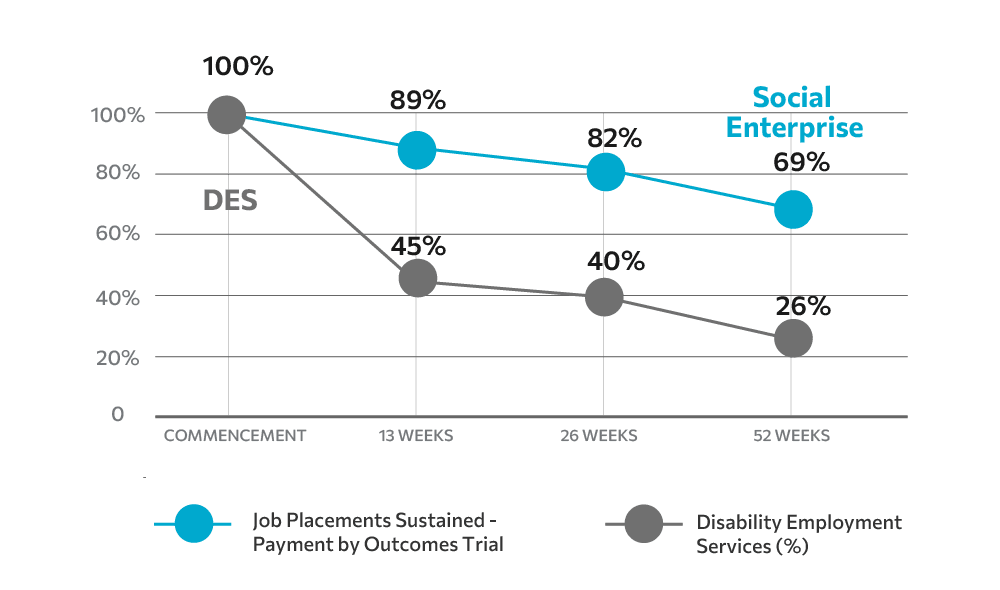As the federal government considers an overhaul of its national employment services system, the 2024 Taylor Fry Report presents a strong case for social enterprise to be an integral part of the solution.
Long term unemployed individuals are more likely to start work sooner, earn more and stay longer, if they are employed by a social enterprise, compared to those supported through Disability Employment Services (DES), according to the report, released today.
White Box Enterprises is running an Australian-first Payment By Outcomes (PBO) Trial for jobs-focused social enterprises in partnership with the Department of Social Services. To mark almost two years of the PBO Trial, White Box commissioned actuarial and analytics firm Taylor Fry to compare data captured from the 17 social enterprises taking part in the trial, with existing publicly available DES data.
It found, social enterprises could return a 20% cost saving to government, equating to $220 million over five years, if the payment by outcomes (PBO) model was adopted more broadly.
“This small but significant trial has given us the unique opportunity to compare social enterprise outcomes directly with existing employment services for a specific group of long-term unemployed people, for the first time,” says Mark Daniels, White Box Enterprises. “The findings are compelling.”
The report, Costs and benefits comparison social enterprise employment and Disability Employment Services, shows individuals in social enterprise employment:
- Stay in work longer - Retention after 12 months with a social enterprise is at 69%, compared to DES at 26%.
- Are earning significantly more - Individuals are estimated to earn an average of $17,000 in their first 12 months of social enterprise employment. Well above the average income of $3,050 for DES participants in their first year, where employment rates are lower, and people are less likely to stay in a job.
- Start work sooner – Individuals working in a social enterprise receive a full award wage from the outset, and on-the-job training. This differs from DES where individuals may be required to undertake various training courses before being placed in paid employment.


The report also found social enterprise under the PBO model is low risk for government, yet delivers better social and economic returns than the current DES model:
- The Government will save an estimated 20% over five years on net welfare, tax and employment support spending, compared to DES, while also increasing individual’s total net income (including welfare) by 14%.
- Savings are estimated to be $21,900 per person, equating to a $2.75M benefit over five years for 132 people. If scaled to 10K individuals, this could save government an estimated $220M over five years.
- Low risk, high return model – Outcome payments only occur when a social enterprise employee reaches a milestone at 6, 12 or 18 months. Outcomes payments are also linked to an earnings threshold, which means you could expect to see an increase in tax contributions from individuals and a reduction in welfare dependency.
“Social enterprises make good financial sense. These are purpose-built businesses designed to support people with the greatest barriers to employment, get back into work. The data reflects this,” said Mr Daniels.
“We’re not suggesting social enterprises replace DES. We just want to see them sitting alongside DES and Workforce Australia, as another option for those who need a level of support and flexibility mainstream workplaces can’t provide.”
In May the Federal Government committed $21.9M to a new WorkFoundations program which will see jobs-focused social enterprises and other businesses help people with complex barriers to work re-engage in the workforce. This program is part of the federal government’s response to the findings of the House Select Committee on Workforce Australia Employment Services, which referenced social enterprise as part of the solution.
“It is great social enterprise is now on the radar of government,” Mr Daniels said. This is progress. The next step is working together to ensure we are thinking about the bigger picture, taking social enterprise beyond grants to an integrated part of the employment services system.”
Geoff Smith CEO of Australia Spatial Analytics (ASA), one of the participating social enterprises in the PBO trial, supports the findings.
“While the DES model works for some individuals, social enterprise needs to have a more permanent place in our employment system. Today ASA employs 150 people and 80% of these individuals are neurodiverse. Prior to finding ASA, most employees share similar accounts of struggling to find a workplace that understood them or recognised them for their unique talents.”
ASA has 11 individuals in the trial, with a 100% retention rate.
Download the report and summary via the Payment By Outcomes Trial page on the White Box website.

